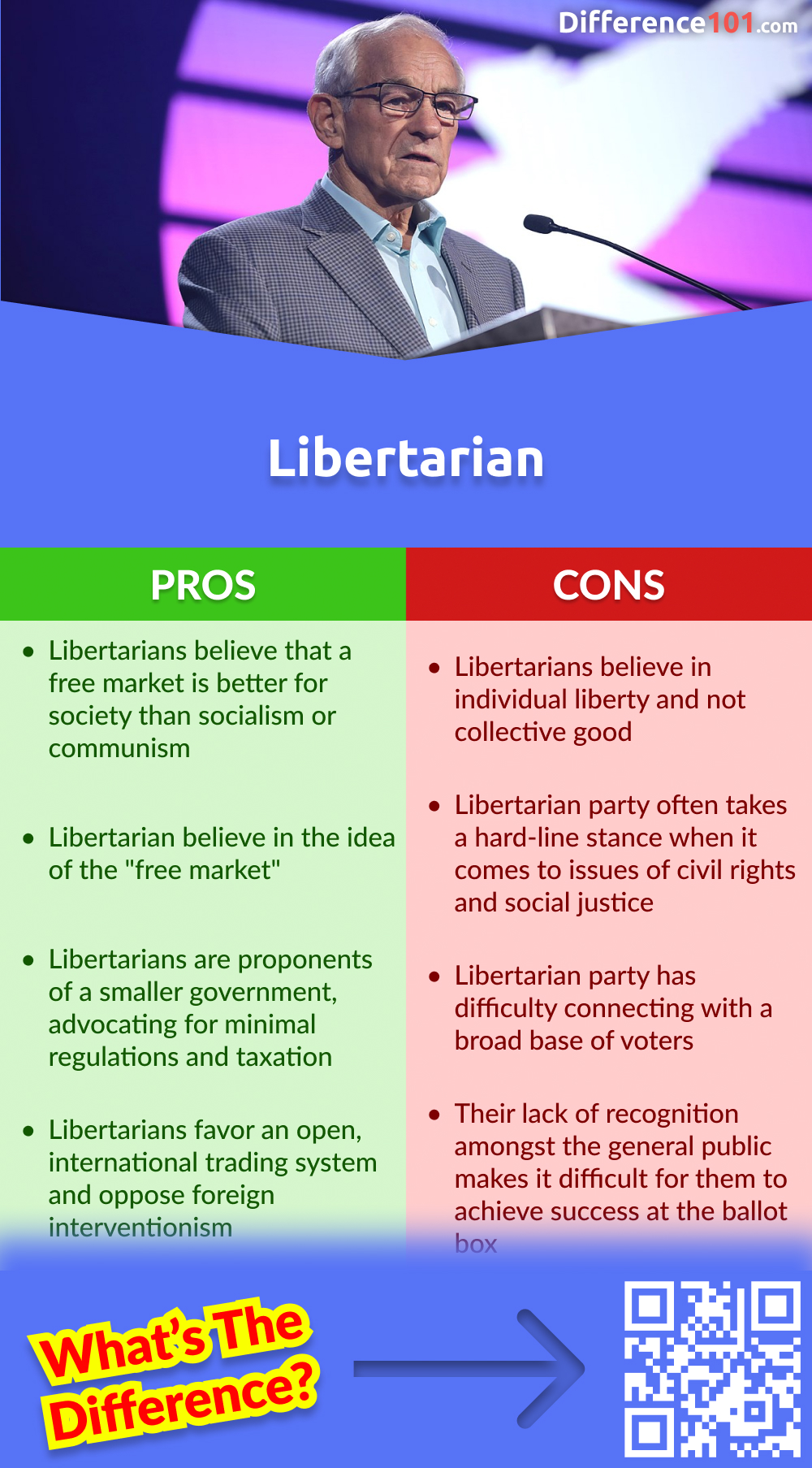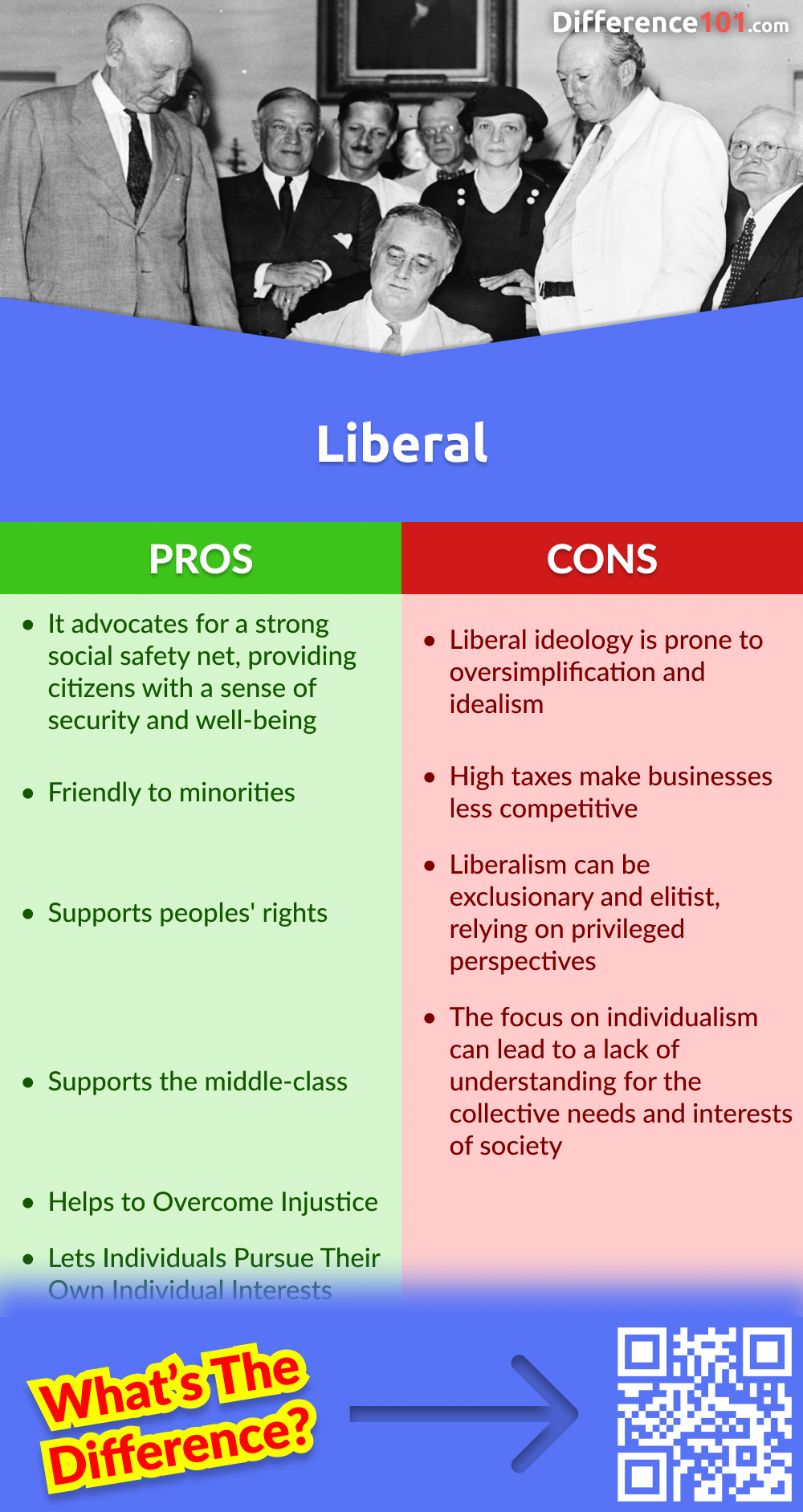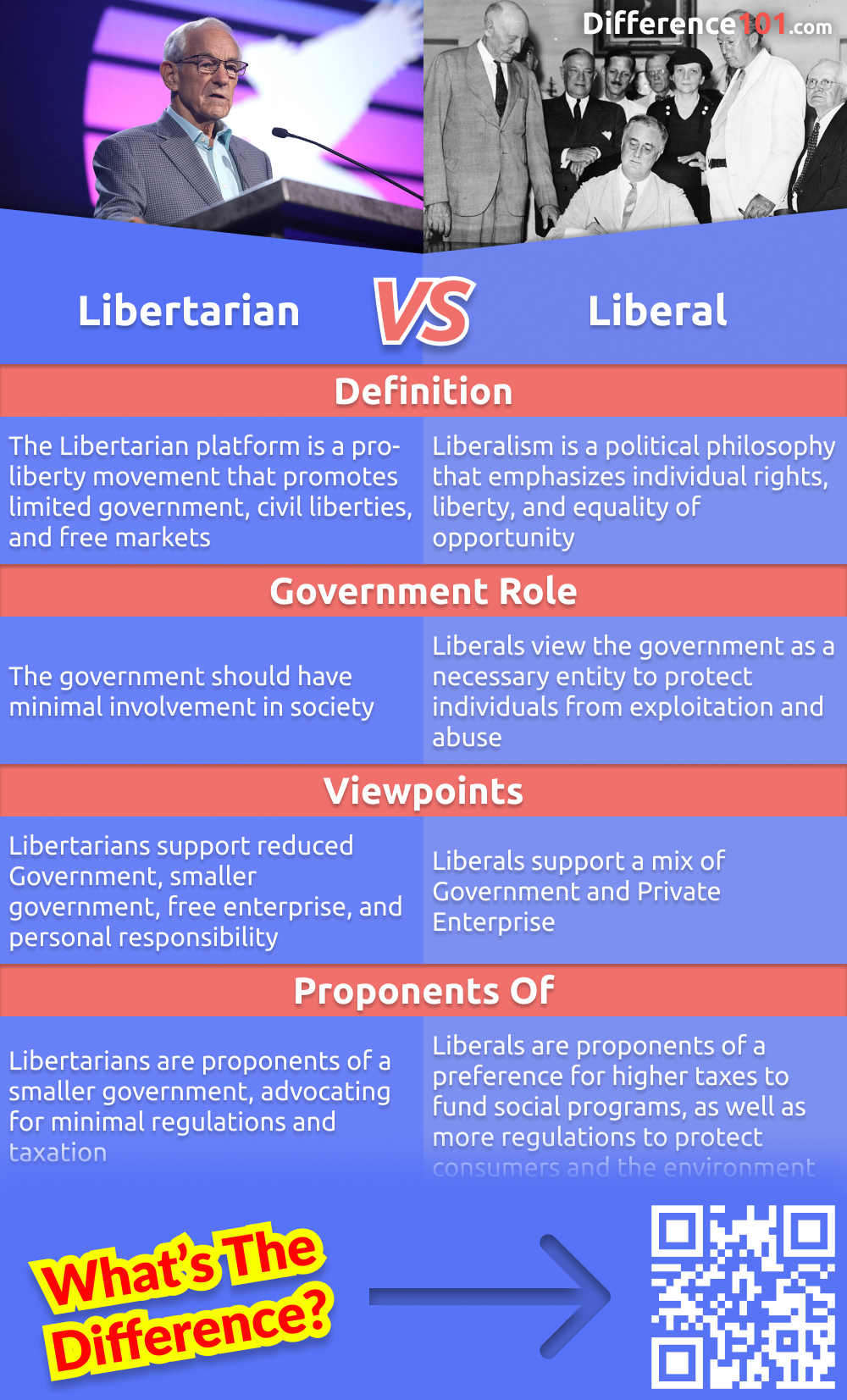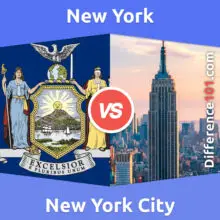We are often bombarded by news stories, debates, and discussions that center on the differences between Libertarian and Liberal ideologies. But what exactly are the distinctions between the two? In this blog post, we will examine the differences between Libertarian and Liberal ideologies in order to better understand the two. We will take a look at their respective definitions, ideologies, and opinions on important issues concerning government and politics. By the end of this post, readers should have a deeper understanding of the two ideologies and how they differ. It is important to remember that Libertarian and Liberal are broad terms that can be interpreted in various ways depending on the individual or organization, so the information provided in this post should serve as a general overview of the two ideologies.
Table of Contents
What Is Libertarian?

Libertarianism is a political philosophy which advocates for the maximization of individual liberty and the minimization of government intervention. It is based on the belief that individuals are the best judges of their own interests and that the government should not interfere with them. Libertarians favor a laissez-faire approach to economics and believe that the free market should be left to operate without interference from the government. They also oppose government regulations that limit individual freedoms, such as restrictions on free speech or the right to bear arms. They advocate for a limited government that respects individual rights and limits its interference in citizens’ lives. Furthermore, libertarians value personal responsibility and oppose government-funded welfare programs. Ultimately, libertarians believe that individuals should be free to pursue their own interests without government interference.
What Is Liberal?

Liberalism is a political philosophy that emphasizes individual rights, liberty, and equality of opportunity. It is based on the belief that individuals should be free to pursue their own interests and goals without government interference. In general, liberals support government intervention in the economy to protect the rights of the disadvantaged and to promote social justice. Liberals also tend to support civil liberties and oppose restrictions on personal freedoms. In addition, liberals believe that the government should provide a social safety net to protect citizens from poverty and other hardships. Liberalism is an evolving and dynamic philosophy, and liberals throughout history have often disagreed on the best way to achieve their goals.
Key Differences Between Libertarian And Liberal
Libertarianism and Liberalism are two distinct political ideologies that differ in their approach to the role of government in society. From a Libertarian perspective, the government should have minimal involvement in society and individuals should have the freedom to pursue their own interests without government interference. This often results in a pro-free market stance and a preference for minimal taxation and regulation. On the other hand, Liberals view the government as a necessary entity to protect individuals from exploitation and abuse. This often results in a preference for higher taxes to fund social programs, as well as more regulations to protect consumers and the environment. In the end, both ideologies prioritize protecting the rights of individuals, but differ in their approach to achieving this goal.
- Libertarians support individual freedom and non-aggression
- Liberals support individual freedom and attempt to stop aggression
- From a Libertarian perspective, the government should have minimal involvement in society
- Liberals view the government as a necessary entity to protect individuals from exploitation and abuse
- Libertarians support reduced Government, smaller government, free enterprise, and personal responsibility
- Liberals support a mix of Government and Private Enterprise
Libertarian vs. Liberal Similarities
Libertarianism and liberalism share some key similarities. Firstly, both ideologies emphasize the importance of individual rights and freedoms, with both accepting the notion of negative rights (i.e. the right to not be interfered with). Secondly, both seek to reduce the role of government in people’s lives, with classical liberals advocating for minimal state interference, and libertarians advocating for no state interference. Lastly, both ideologies are supportive of the right to own private property and to engage in free market capitalism. While there are important differences between libertarianism and liberalism, it is clear that they share some fundamental similarities.
- Both ideologies emphasize the importance of individual rights and freedoms
- Both seek to reduce the role of government in people’s lives
- Both ideologies are supportive of the right to own private property and to engage in free market capitalism
- Individual freedom
- Personal responsibility
- Equal protection of law
Libertarian vs. Liberal Pros and Cons
Libertarian Pros & Cons

Libertarian Pros
The Libertarian platform is a pro-liberty movement that promotes limited government, civil liberties, and free markets. It is a popular alternative to more traditional forms of government. Advantages of the Libertarian platform include a commitment to individual freedom, economic liberty, and personal responsibility. Additionally, Libertarians are proponents of a smaller government, advocating for minimal regulations and taxation. This allows for greater autonomy and personal control over one’s life. Furthermore, Libertarians favor an open, international trading system and oppose foreign interventionism, believing that free trade and the free movement of people create a strong and prosperous economy. Finally, the platform has a strong commitment to civil liberties such as freedom of expression and privacy rights, which are essential to protecting individuals from oppressive governments.
- Libertarians believe that a free market is better for society than socialism or communism
- Libertarian believe in the idea of the “free market”
- Libertarians are proponents of a smaller government, advocating for minimal regulations and taxation
- Libertarians favor an open, international trading system and oppose foreign interventionism
Libertarian Cons
The Libertarian party is a political party in the United States that advocates for limited government and strong personal freedoms. While Libertarians are passionate about their ideals and are committed to achieving an equitable and fair society, there are some drawbacks to this political philosophy. The first disadvantage is that the Libertarian party often takes a hard-line stance when it comes to issues of civil rights and social justice. This can lead to unintended consequences, such as the party being perceived as unsupportive of these important issues. Additionally, the Libertarian party has difficulty connecting with a broad base of voters. This is due to their policy stances that are often seen as too far removed from the mainstream. Finally, their lack of visibility and recognition amongst the general public makes it difficult for them to achieve success at the ballot box.
- Libertarians believe in individual liberty and not collective good
- Libertarian party often takes a hard-line stance when it comes to issues of civil rights and social justice
- Libertarian party has difficulty connecting with a broad base of voters
- Their lack of recognition amongst the general public makes it difficult for them to achieve success at the ballot box
Liberal Pros & Cons

Liberal Pros
The Liberal ideology offers a number of advantages and pros for society. Firstly, it emphasizes individual freedom and rights, allowing individuals to pursue their aspirations and beliefs without fear of oppression. Secondly, it advocates for a strong social safety net, providing citizens with a sense of security and well-being. Thirdly, it encourages diverse opinions and a free exchange of ideas, leading to a vibrant and thriving democracy. Fourthly, it utilizes progressive taxation to fund public services, helping those in need. Lastly, it supports economic growth and development, making it easier to create jobs and ensure greater economic stability. All in all, the Liberal ideology provides a comprehensive and forward-thinking approach to social and economic issues.
- It advocates for a strong social safety net, providing citizens with a sense of security and well-being
- Friendly to minorities
- Supports peoples’ rights
- Supports the middle-class
- Helps to Overcome Injustice
- Lets Individuals Pursue Their Own Individual Interests
Liberal Cons
The Liberal ideology is a popular way of thinking, but like all ideologies, it is not without its drawbacks. Firstly, the Liberal ideology is prone to oversimplification and idealism. It is often used to suggest the idea of a perfect world without considering the complexities of reality. Additionally, Liberalism can be exclusionary and elitist, relying on privileged perspectives rather than those of marginalized people. Moreover, the focus on individualism can lead to a lack of understanding for the collective needs and interests of society. Finally, an overreliance on Liberalism can lead to a lack of creativity, as it can become stagnant in its approach to problem-solving. Overall, while the Liberal ideology can be beneficial in certain contexts, it is not without its drawbacks.
- Liberal ideology is prone to oversimplification and idealism
- High taxes make businesses less competitive
- Liberalism can be exclusionary and elitist, relying on privileged perspectives
- The focus on individualism can lead to a lack of understanding for the collective needs and interests of society
Comparison Table: 4 Key Differences Between Libertarian And Liberal
| Components | Libertarian | Liberal |
|---|---|---|
| Definition | The Libertarian platform is a pro-liberty movement that promotes limited government, civil liberties, and free markets | Liberalism is a political philosophy that emphasizes individual rights, liberty, and equality of opportunity |
| Government role | The government should have minimal involvement in society | Liberals view the government as a necessary entity to protect individuals from exploitation and abuse |
| Viewpoints | Libertarians support reduced Government, smaller government, free enterprise, and personal responsibility | Liberals support a mix of Government and Private Enterprise |
| Proponents of | Libertarians are proponents of a smaller government, advocating for minimal regulations and taxation | Liberals are proponents of a preference for higher taxes to fund social programs, as well as more regulations to protect consumers and the environment |
Comparison Chart

Comparison Video
Conclusion
In conclusion, libertarianism and liberalism can be seen as two sides of the same coin. Libertarians are generally more interested in economic and social freedom while liberals are more focused on creating a society that is fairer and more equitable. Both ideologies are necessary to create a balanced society, and it is the responsibility of citizens to understand the differences between the two so that they can make informed choices about their political opinions.







